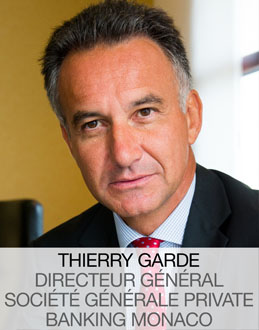Thierry Garde took over from Olivier Lecler as Managing Director of Société Générale Private Banking Monaco in January 2013. We asked him about his feelings after almost 3 years in Monaco.
How would you analyse the Monaco Financial Centre?
It is a great financial centre with quite a high number of players, banks or asset management companies.
We should observe a banking consolidation trend, which is slow in coming despite the constraints now weighing on financial institutions. The burden of compliance, structures and monitoring of accounts is leading them to densify their workforce, thus increasing overheads and necessarily resulting in high break-even points. Critical mass will be necessary for holding up.
The financial centre is attractive, as shown by the continual increase in assets deposited and managed, despite a tax regularisation trend: the loss of some customers is being largely offset by those who wish to render the holding of their assets ‘on-shore’. This attractiveness is due to a number of factors: the strength of the banking sector, and a very well-regulated financial centre, controlled by the local regulator and the Autorité de Contrôle Prudentiel et de Résolution (ACPR – the French regulator) when a third country regulator is not added, depending on the shareholding relationships.
Quality players provide a very good level of service and products and the teams are efficient.
The financial centre is also very responsive – the decision-making processes are streamlined and effective. It benefits from historical ties with a number of countries such as Russia, Africa and the Middle East.
As for the customers, they value Monaco’s security and overall the quality of life it offers them (education, health system, transport).
With a historic high presence of Russian customers in Monaco, how is that market evolving?
We note a certain slowdown, an inflexion connected to the economic, financial or political situation, but the underlying trend continues and historic links have been established, as evidenced by « 2015, the Year of Russia in Monaco » and its highly successful events.
The Russian government enacted or adopted some rules on asset relocation, but for us Russian customers remain an important area of development which is quite largely represented in our business. In Monaco this remains a priority area of development and we are strengthening the number of Russians or Russian speakers in our workforce, for private banking as well as retail banking. Our offering is adapted to the profile of our Russian customers and a longstanding relationship with this customer base. Our activities are obviously in line with the bank compliance rules and we apply all the legal and regulatory requirements in force.
What about Chinese customers?
They are fairly marginal. Monaco is in any case far from the geographical and cultural base of Chinese customers, and coming to the Riviera is less ‘natural’ for them that for the Russians who have been present here since the 19th century. The Chinese head naturally for the Singapore and Hong Kong financial centres. South Americans come to Monaco but they too are quite far from their cultural bases. As for the Middle-Eastern customer base, it is stable, less-based in Monaco than customers from the countries of the East, and found more in Cannes. But they are very attached to service quality, proximity and expertise – key qualifications they find in Monaco e.g. for financing luxury properties on the Riviera, in Paris, London, the Alps ski resorts, or Evian.
What strategic redirection did you wish to give Société Générale in Monaco?
We are No. 1 in the financial centre for credit, with almost 20% of the total amount granted there. And we are in the Top 5 for asset management.
We need to diversify the business as much as possible, and consolidate in our chosen geographical areas where we have a strong presence, to take advantage of group synergies.
That means Central Europe and Eastern Europe: Russia, Czech Republic, Bulgaria, Romania, the Balkans, Slovenia, Croatia, Poland. Another example is Africa - Northern or Sub-Saharan - where we are present in 16 countries, not all of which are French-speaking. We have 11,500 employees there and Société Générale generates over a billion in revenue in the continent of Africa, which is a priority for us as our Managing Director Frédéric Oudéa emphasised recently.
Furthermore, the number of Monaco residents is growing. We must be very available for these customers, with the goal of having them repatriate a maximum number of their assets to Monaco. Our legitimacy is strong, both in private banking and retail banking. We are developing an offering which matches their expectations: mandated financial management (discretionary management and advisory management), tax and wealth consultancy, inheritance issues etc. We offer property financing capabilities for exceptional villas, yachts and private jets and our experts are highly specialised.
As for retail banking, the density of our network enables us to offer efficient local service. We have the capacity to finance domestic needs (home loans, consumer loans).
However, Société Générale’s specificity in Monaco is our very close relationship with businesses in the broad sense. With key players (international trading, cruise lines, oil drilling, construction etc.) but also with merchants, craftsmen and professionals. We are close to the FEDEM (Fédération des Entreprises Monégasques) representatives and we are committed to financing and developing the local economy.
Can you say a final word on the banking industry in general?
Depersonalisation of contacts is the risk in our business. This is also why the asset management companies – an alternative offering to the banking system – and family offices are growing. Customers are seeking responsiveness, good service quality and intellectual closeness. At some institutions they may perceive a trivialisation of contacts, which we must avoid at all costs. At Société Générale we have put an organised offering in place by turning to professionals who defend their customers’ interests.






